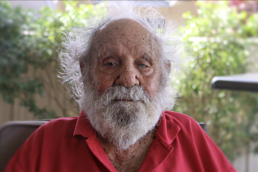These life stories may contain descriptions of childhood trauma and abuse, as well as images, voices and names of people now deceased. If you need help, you can find contact details for some relevant support services on our support page.
Harry Bennett (1917-2017) was once the oldest living member of the Stolen Generations.
Harry was born at Old Telegraph Station, in Tennant Creek, Northern Territory. His mother Priscilla, was an Aboriginal woman and his father, Jim, was a white man.
My mum and dad had a feeling for one another, you know what I mean? And I’m the result (ABC News).
At the time it was a crime punishable with seven years’ jail for a white man to be with an Aboriginal woman. Jim left town to evade police while Priscilla was pregnant. Priscilla also left town after Jim’s mother told her to kill the baby to avoid shaming her family.
My mother had sense enough not to kill me because the Aboriginal people wanted this little coloured baby that was born in the desert country (BWD Magazine).
Harry spent his early years in the desert with his mother, Aboriginal step-father, and extended family, who hid the child from the authorities. Harry would be buried in the sand up to his head and surrounded by scrub when the Welfare came. When he cried, the elders crowded around and started singing and clapping to drown out the noise.
In those days the nomads would go around and pick all the other clans like ours and all head out bush together. We roamed around the desert as a clan for about two or three years, never coming back into the Telegraph line (BWD Magazine).
Harry’s mother and step-father later worked as housemaid and ‘yardman’ for a policeman in Newcastle Waters. The policeman would sometimes take Harry in his old ute on the mail run to Birdum (now Larrimah).
About the third time that I went with the policeman to Birdum, in about 1928 or 29, when I was 10 or 11 years old, I woke up to what was going to happen to me (BWD Magazine).
Harry was forced onto a train to Darwin, and then Pine Creek. He would never see his mother again.
I remember the last time I saw my mother was when she was running after the train, wailing and crying out for me, along with all the other mothers whose children were being taken away (BWD Magazine).
Then, Harry was taken to The Bungalow in Alice Springs in “a truck, like you pick up cattle with, except this time he was using it to pick up child prisoners” (BWD Magazine). Harry ran away a few times during the seven years he spent at The Bungalow. He was so badly treated he became deaf from beatings.
We lived in little shacks at The Bungalow, sometimes there would be up to 20 or 30 of us crammed into these shacks with only a bucket to use for going to the toilet. We were like sardines in a can and in winter we would freeze (BWD Magazine).
Harry left The Bungalow when he was around seventeen. In Tennant Creek, he worked as a “houseboy” for an engineer for a while, became an apprentice, and went droving.
Harry’s white grandmother came to Tennant Creek to see what he looked like. Harry kept away from her because she resented the color of his skin.
I didn’t have a feeling for her or my white father, I had more of a feeling for my Aboriginal step-father because he reared me, looked after and fed me (BWD Magazine).
Harry later became involved in the Aboriginal land rights movement, which he wrote about in 1998.
We had the right to claim our land and I was the first one to jump in…I put a claim all over this country but especially our country here on Warlmanpa land. Now we have got a big country…
I was right here when we got given the title back to our land. I was the first one to put a claim in about 1976, ’77 or ’78. I went through the Land Council and put a claim to it… (Bennett Japaljarri, 1998).
Harry went on to have three children, thirteen grandchildren, and twenty-four great-grandchildren. He lived to be one-hundred and one years old and spent his final years in Katherine and Tennant Creek before passing away in 2017.
References:
Bennett Japaljarri, Harry. (1998). A concentration camp. In Take Power like this old man here. Edited by Alexis Wright, Alice Springs, NT: LAD Press, pp 126-129.
Bennett, Harry. “A foot in each camp.” BWD Magazine, Summer 2017 (reprint from Barkley News Pictorial). http://www.bwdmag.com.au/BWD_15/BWD15_01-44.pdf
Dias, Avani. “Stolen Generations’ oldest living member, Harry Bennett, reflects on his life after 100 years.” ABC News, 8 June 2017. https://www.abc.net.au/news/2017-06-08/stolen-generations-oldest-surviving-member-harry-bennett/8598856
“The Bungalow (1914 – 1942).” Find & Connect, 2021. https://www.findandconnect.gov.au/guide/nt/YE00019
Image available here.
